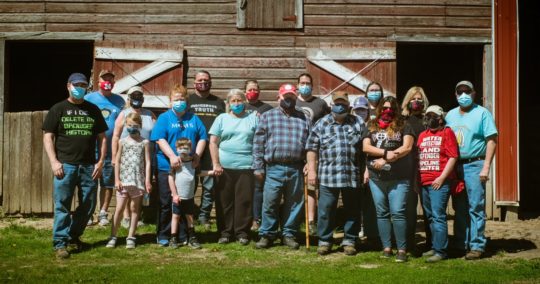Introduction
From August 20th to September 2nd, I will be on the road on the Stop the Pipeline Tour, a group of landowners and individuals traveling from Texas to Washington, D.C. to take part in the Tar Sands Action, a campaign of civil disobedience at the White House to raise awareness on the Keystone XL pipeline issue and to call for President Obama to deny TransCanada’s permit for the project. I am a fourth-generation rancher from the Nebraska Sandhills. My family raises organic, grass-fed beef and dairy on native prairie, and we and our cattle drink from the Ogallala aquifer. The Keystone pipeline threatens the land we love and our way of life. It could damage a fragile, unique ecosystem and destroy our livelihood, which is producing great-tasting, nutritious food without the use of chemical pesticides, fertilizers, and herbicides and with minimal fossil fuel use. I am traveling with four other folks, among them David Daniel, a Texas landowner who has been involved in fighting the pipeline since 2008:
I will be blogging about the trip along the way, posting photos and videos of the people and places along the way that will be affected by the pipeline.
Stop the Pipeline Tour: Day One
On Saturday, August 20th, I wake up at 5:00 to catch a ride to Omaha, then fly to Dallas, Texas, where David Daniel picks me up at the airport in the Stop The Pipeline Tour bus. I have known David for a little over a year, since July 2010, when his wife heard me on NPR discussing the fact that the Keystone XL pipeline hadn’t been approved by the State Dept., so TransCanada had no legal authority to use eminent domain. David called me the next day, asking if it was really true that we could still do something to stop the pipeline. It was true then, and it’s true now. Since then, David has been extremely active in fighting the Keystone XL pipeline. He organized a group called Stop Tarsands Oil Pipelines (STOP), joined a delegation to Washington, D.C. with me and other Nebraskans in March 2011, traveled to the CitiBank shareholders meeting to encourage them to discontinue funding TransCanada, and participated in the 2011 Netroots Nation conference. I am glad to be going on this trip with him, as he is a passionate and intelligent individual who has done a great job of organizing people in Texas around the pipeline issue. After a lunch at Bodacious Barbecue outside Tyler (I can heartily endorse the chopped beef sandwich with potato salad and sweet tea), we drive into town to the park where a group of about 50 activists awaits our arrival. We step out of the bus into 106-degree heat, but the sultry weather doesn’t deter us or the energetic Texans who have come out to voice their opposition to the Keystone XL pipeline. They are prepared with a “Stop the Tar Sands” anthem as well as a high-energy chant that they repeat raucously. Though our football teams may have been Big 12 rivals, Texans truly value their land and water just as much as Nebraskans do, and the extreme drought conditions occurring in Texas have done much to magnify the importance of clean groundwater supplies such as the Ogallala aquifer, which also underlies part of the Lone Star state. I am impressed with the amount of passion these folks have. As I’ve seen in Nebraska, the range of Texans opposed to TransCanada’s tar sands pipeline is across the board. There really is no way to characterize the “typical” pipeline fighter. Carrying signs in Tyler are teachers, students, farmers, carpenters, and retired military veterans ranging in political persuasion from “Red River Republican” to “Gun-Toting Liberal,” to name a couple of the self-descriptors I hear. What strikes me most is that people in the Lone Star state are intimately familiar with the oil business and with crude oil pipelines, yet they oppose the Keystone XL. The Texans I meet are not anti-oil treehugging environmenalists. They are people who live in an “oil state” that was built on Black Gold and Texas Tea, people who know the environmental and economic implications of oil drilling and pipelines.
One man tells me, “My family’s been in the oil business for generations. We know oil and we know pipelines, and this is bad oil and a bad pipeline.” Indeed, many of the landowners I talk to have multiple oil pipelines on their property already; however, they are concerned not only about the volatile chemical properties of tar sands oil, but also about the safety specifications of the pipeline design, including pipe thickness and pumping pressure. Contrary to what TransCanada would have us believe, the Keystone XL is not your typical oil pipeline, nor is tar sands diluted bitumen your typical oil. People from Montana to Texas know that, yet TransCanada continues their smoke and mirror show in an attempt to deceive our citizens and lawmakers into biting on their shiny lures and slick talking points. When the day is over, we drive the RV back to David Daniel’s house, where we watch the local news coverage of the rally. We also learn that about 65 fellow pipeline fighters were arrested earlier in the day for taking nonviolent action in front of the White House. Tomorrow, we will head north and cross the Red River into Oklahoma, where, similar to Nebraska, landowners have been silenced by gag orders TransCanada euphemistically refers to as “confidentiality agreements.” We will visit those landowners, see the land that they are trying to protect, and share stories gathered along the pipeline route. Stay tuned for more of the Stop The Pipeline Tour updates!



